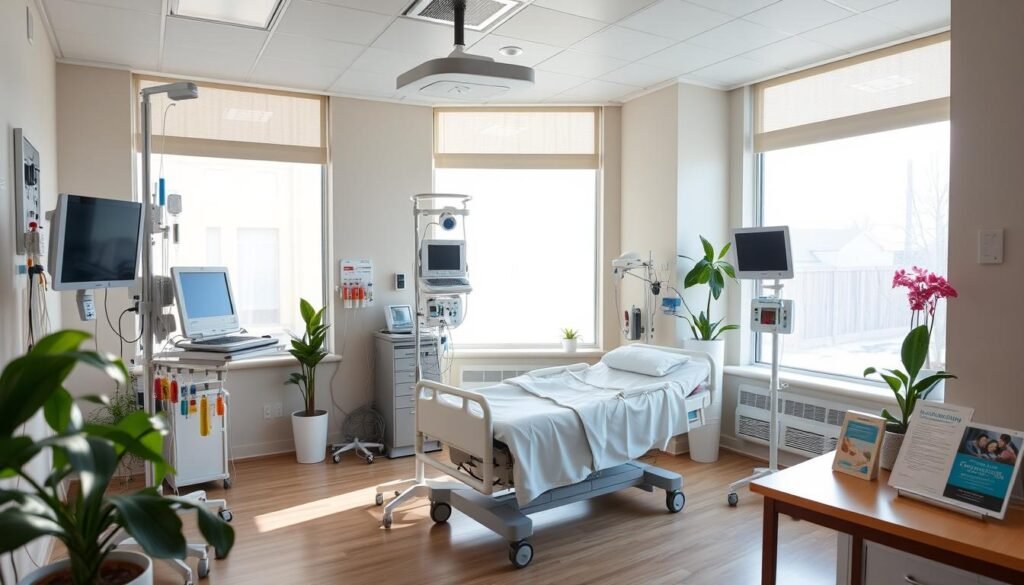Did you know that over 1.9 million new cancer diagnoses are expected in the United States in 2023? This number shows how important it is to know the common symptoms of cancer. One major symptom is cancer dizziness fatigue, which greatly affects patients’ daily lives.
Research shows that between 40–70% of people with cancer feel extremely tired. This is much higher than the 10% of the general population who report the same issue. This kind of fatigue doesn’t go away with rest or sleep, adding to the daily struggles of those affected.
Besides extreme tiredness, dizziness is common among cancer patients. It can be caused by the cancer itself or the side effects of treatments. Understanding these symptoms is key. It helps in providing better care and support for those dealing with cancer.
Key Takeaways
- Over 1.9 million new cancer diagnoses are expected in the United States in 2023.
- 40-70% of cancer patients experience fatigue, significantly higher than the general population.
- Cancer fatigue is complex and not easily alleviated by rest.
- Dizziness may stem from the cancer itself, anemia, or treatment side effects.
- Recognizing these symptoms can aid in managing overall patient care.
- Thorough understanding of symptoms helps in ensuring timely medical attention.
Understanding Cancer Symptoms
Knowing the signs of cancer is key to catching it early. Many report losing weight without trying, a common cancer sign. This might happen along with other symptoms like night sweats, often seen in middle-aged women. Feeling extremely tired all the time, even with enough rest, is also a red flag.
Signs of cancer can differ a lot. Blood in the stool might mean gastrointestinal cancer. A long-lasting cough could be a lung cancer clue, especially with chest pain and breathing trouble. Don’t overlook a fever over 100.5°F for days; it might mean lymphoma or leukemia.
Skin changes should not be ignored. New growths or sores that don’t heal might be skin cancer. Also, breast lumps need checking, while trouble swallowing could mean esophageal cancer. Unexplained bleeding, in urine or semen, is serious and could point to bladder or prostate cancers.
About 56% of leukemia patients first felt very tired. This shows how key it is to know cancer signs. Cancer tiredness means being weak all the time, getting tired easily, and having trouble focusing. Anemia symptoms like being short of breath or pale also go with this tiredness.
If you’re unusually and constantly tired, see a doctor. Being aware of various cancer symptoms helps stay alert. It’s crucial to talk to doctors about any changes in your body.
What is Cancer Dizziness Fatigue?
Cancer dizziness fatigue causes problems for many people with cancer. It begins with knowing what dizziness and fatigue mean. By recognizing these, patients and caregivers can better handle them.
Defining Dizziness and Fatigue
Dizziness includes feeling lightheaded, unsteady, or as if everything is spinning. Fatigue is extreme tiredness that rest doesn’t fix. It’s more than feeling sleepy and can be very limiting. Understanding these is key, especially since fatigue impacts many cancer patients’ lives.
Why Fatigue Is Common in Cancer Patients
Many cancer patients, up to 70%, feel fatigued during and after treatment. This fatigue comes from different places:
- Late-stage cancer often means more fatigue than the early stages.
- Chemotherapy and radiation treatments are common causes of tiredness.
- Post-surgery, patients could be tired for weeks or months.
- Targeted and hormone therapies may also lead to feeling drained.
- Anemia, related to cancer or its treatment, often causes dizziness and fatigue.
Emotional stress, like anxiety and depression, can make fatigue worse. Not sleeping well or being inactive also adds to the tiredness. This affects daily life and well-being greatly.
| Factor | Impact on Fatigue |
|---|---|
| Advanced Cancer Stages | Higher probability of experiencing fatigue |
| Chemotherapy | Reduces red blood cells, causing fatigue |
| Radiation Therapy | Increases fatigue during and after treatment |
| Surgery | Fatigue may linger for several weeks |
| Emotional Factors | Heightened anxiety and depression lead to fatigue |
It’s vital to understand cancer dizziness fatigue to support those affected. Knowing how fatigue affects lives allows for better care and talks between patients, caregivers, and doctors.
Causes of Dizziness in Cancer Patients
Dizziness is common among cancer patients for many reasons. It’s vital to understand the root causes to help manage it. Dizziness can come from the tumor’s impact or side effects of treatment.
Effects of Tumors on the Body
Tumors can disturb how the body normally works. They might press on cranial nerves, causing dizziness. Also, large tumors might mess up the body’s balance by affecting sensory pathways. This is often seen in patients with brain tumors or when tumors press on nearby parts.
Side Effects of Treatment
Treatment for cancer can cause side effects like dizziness. Chemotherapy and radiation might make patients feel tired and weak, which makes balance harder. Dehydration, anemia, and drug side effects also contribute to this problem. Understanding these causes is key to helping patients feel better.
How Cancer Treatments Induce Fatigue
Cancer treatment, including chemotherapy and radiation, is a key cause of fatigue. Knowing the side effects is vital for patients and caregivers. It’s important because fatigue affects daily activities.
Chemotherapy Side Effects
Chemotherapy leads to many side effects, with serious fatigue being one. Anemia is common and happens when red blood cells are destroyed. This limits oxygen in the body, causing weakness and tiredness. Also, chemotherapy drugs can affect the brain. This may result in “chemo brain,” causing memory issues and trouble focusing. These issues make patients feel more tired.
Radiation Therapy Impact
Radiation therapy also causes fatigue, made worse by anemia and other side effects. Many patients feel very tired from it. Direct damage to cells from radiation is one reason. Symptoms like diarrhea, weight loss, and pain can also make fatigue worse. Using chemotherapy and radiation together may increase fatigue even more.
| Treatment Type | Common Side Effects | Impact on Fatigue |
|---|---|---|
| Chemotherapy |
|
High risk of significant fatigue due to anemia and neurotoxic effects. |
| Radiation Therapy |
|
Direct cellular damage contributes to severe fatigue levels. |
For better understanding of cancer fatigue treatment and management, talk to health experts. They can provide coping strategies to ease fatigue during treatment.
Recognizing Non-Cancer Related Causes of Dizziness
Dizziness can come from many places, not just cancer-related issues. Recognizing these causes is key for understanding health better. It helps doctors diagnose and treat effectively.
Medication Side Effects
Many face dizziness due to medication side effects. Drugs like antidepressants and blood pressure medications are usual culprits. It’s vital for patients to talk about all drugs with doctors, especially when dizziness starts with a new pill.
Health Conditions That Contribute
Different health issues can make you dizzy. Not drinking enough water can mess with your balance, causing lightheadedness. Anxiety disorders also show up with dizziness among other symptoms. Knowing these health problems is important for the right treatment.
Keeping an eye on these issues can better your health and lessen dizziness.
It’s crucial to handle these non-cancer dizziness causes. While cancer-related dizziness is one aspect, managing medications and health issues can improve outcomes. For more tips on better health, look at diet and lifestyle changes. Here’s a helpful resource.
| Condition | Potential Symptoms |
|---|---|
| Dehydration | Dizziness, dry mouth, fatigue |
| Anxiety Disorders | Dizziness, rapid heartbeat, sweating |
| Medication Side Effects | Dizziness, nausea, fatigue |
Common Symptoms Associated with Malignancy
Identifying symptoms of cancer early can greatly help in starting treatment quickly. If you notice symptoms that don’t go away or get worse, pay attention. They might seem minor at first but could point to a bigger problem. These signs can differ based on the cancer type.
Understanding Tumor Symptoms
Tumor symptoms can affect various parts of the body in different ways. Sometimes, unexpected weight loss is a clue that cancer cells are present, causing the body to change how it uses energy. Other common signs include:
- Persistent cough: This may suggest lung problems or related cancers.
- Night sweats: This is often linked with specific cancers.
- Abnormal skin changes: Sudden differences in how your skin looks or feels can be a cancer sign.
- Bone pain: This might mean the cancer has spread to bones.
Other Warning Signs of Cancer
There are more signs of cancer to watch out for. Key warning signs are:
- Frequent infections or fever, especially if they keep coming back without a clear reason.
- Constant tiredness that doesn’t get better with rest.
- Appetite changes that lead to losing weight without trying.
- Unusual bruising or bleeding, pointing to problems with blood.
It’s important to keep an eye on cancer signs. Having several warning signs means it’s time to check things out further. Catching cancer early can make treatment more effective.

When Should You See a Doctor?
Knowing when to see a doctor for cancer signs is key. You should listen to your body’s signals. If you feel very tired, lose weight for no reason, or often feel dizzy, it’s time to talk to a doctor. Finding cancer early can really help treat it more successfully.
Identifying Persistent Symptoms
Keep an eye on your health to spot any lasting symptoms. Look out for:
- Unexplained fatigue that rest doesn’t help
- Severe dizziness, especially with other alarming signs
- Weight loss over 5% of your body weight without trying
- Changes in appetite even if you’re not dieting or changing habits
- A cough that stays for more than 3 weeks
- Skin changes like moles that bleed or look different
Noticing these symptoms early can lead to quick action. It’s important for patients to speak up about their health concerns. Paying close attention to these symptoms could catch cancer early, which helps a lot with treatment.
The Importance of Early Diagnosis
Spotting cancer early can greatly improve your treatment success. Waiting too long to see a doctor could make cancer harder to treat. Getting help quickly can be a game-changer. If your symptoms get worse or don’t go away, see a doctor without waiting.
Being aware and proactive about your health is crucial. Watch for any changes and talk to doctors about any worrying symptoms quickly.
| Symptom | Recommended Action |
|---|---|
| Severe Fatigue | Consult a doctor, especially if sudden or unexplained |
| Persistent Dizziness | Seek medical evaluation for potential underlying causes |
| Unexplained Weight Loss | Schedule a check-up to rule out serious conditions |
| Changes in Skin or Moles | Visit a dermatologist for assessment |
| Persistent Cough or Breathing Issues | See a healthcare provider for a thorough evaluation |
Managing Cancer Dizziness Fatigue
Dealing with cancer and its symptoms like dizziness and fatigue needs a full approach. It includes changes in lifestyle, keeping an eye on symptoms, and getting both emotional and physical support. Using good strategies can greatly help improve life quality for those fighting cancer.
Strategies for Managing Symptoms
To fight cancer fatigue well, here are some strategies:
- Maintain a Regular Sleep Schedule: A steady sleep routine can make sleep better, fighting off fatigue.
- Engage in Light Activities: Gentle activities can raise energy levels without being too much.
- Stay Hydrated: Drinking at least 8 glasses of water a day helps avoid dizziness and keeps muscles strong.
- Short Naps: Taking quick naps, around 30 to 40 minutes, can bring back energy during the day.
- Physical Activity: Mild regular exercise helps deal with tiredness and boosts physical health.
- Mindfulness Techniques: Methods like meditation, yoga, and guided imagery can reduce stress and help relax.
Seeking Support
It’s critical to find strong support when dealing with cancer. Bringing together family, friends, and doctors creates a powerful support system. This helps with the emotional challenges cancer brings. Talking to doctors about how you feel and side effects is key. They can suggest changes or treatments to help, especially when tiredness is hard to shake or symptoms keep coming back.

The Role of Nutrition in Combatting Fatigue
Nutrition is key in dealing with cancer fatigue. Many patients feel better with a good diet. It boosts energy and strengthens the immune system. It also makes you feel overall healthier. Paying attention to hydration for cancer patients is very important. This is especially true when treatment side effects make eating hard. Adding certain foods to your diet can make a big difference in how you feel.
Dietary Recommendations for Cancer Patients
Eating lots of different healthy foods is crucial for fighting fatigue. Many people who have had lymphoma feel tired even after treatment. But, by eating certain foods, they start feeling more energetic. These foods include:
- Tomatoes and orange veggies for their high lycopene and carotenoids.
- B vitamins, like folate and thiamine, which many don’t get enough of.
- Omega-3 fats from fish or flaxseeds for better health.
Eating plans in these studies often have a vitamin C fruit, leafy greens, and whole grains. This helps a lot with nutrition for cancer fatigue.
The Importance of Hydration
Drinking enough is just as important as eating right for cancer patients. Try for 8-10 glasses of fluids a day. It eases fatigue and nausea from treatment. Staying hydrated helps with digestion and keeping energy up. This makes a big difference in your mental and physical feeling. When nausea makes eating tough, choosing the right foods helps a lot. Foods like juicy fruits and soups keep you hydrated and nourished.
Exploring Oncology Treatment Options
People with cancer have many treatment options. These include conventional therapies and new, innovative treatments. Each option is tailored to meet individual needs.
Types of Treatments Available
Conventional oncology treatments mainly consist of:
- Chemotherapy: Uses strong drugs to kill fast-growing cancer cells.
- Radiation Therapy: Uses high-energy rays to kill cancer cells.
- Surgery: Removes tumors and tissue around them.
These therapies are the result of years of research. They offer effective ways to manage cancer. Along with these, new treatments are being developed quickly.
Emerging Therapies in Cancer Care
New cancer treatments are exploring different approaches:
- Targeted Therapy: Targets specific genetic markers in cancer cells, sparing normal tissues.
- Immunotherapy: Strengthens the immune system to fight cancer.
- Gene Therapy: Changes the genetic makeup of cancer cells to stop their growth.
These innovative treatments add to the existing ones, bringing hope for better outcomes. As research proceeds, these therapies are tested in clinical trials for effectiveness and safety.

| Treatment Type | Mechanism | Targeted Conditions |
|---|---|---|
| Chemotherapy | Kills rapidly dividing cancer cells | Most cancer types |
| Radiation Therapy | Destroys cancer cells using high-energy rays | Local tumors |
| Targeted Therapy | Targets specific genetic defects in cancer cells | Cancers with known genetic mutations |
| Immunotherapy | Enhances the body’s natural defenses | Select cancers |
| Gene Therapy | Alters the genetic material in cancer cells | Potential for various cancers |
Conclusion
Cancer symptoms like dizziness and fatigue can majorly impact daily life. Understanding these symptoms is key to managing them. Knowing warning signs lets patients get help fast, addressing serious issues early.
Talking openly with doctors about cancer fatigue is crucial. This leads to better ways to handle symptoms, improving life quality. Stories from patients, like Sandy, highlight how crucial support and managing symptoms are.
Patients should stay hopeful and learn about their symptoms. By knowing causes and treatments for dizziness and fatigue, they can improve their life. With the right help and resources, a fulfilling life is possible despite cancer.